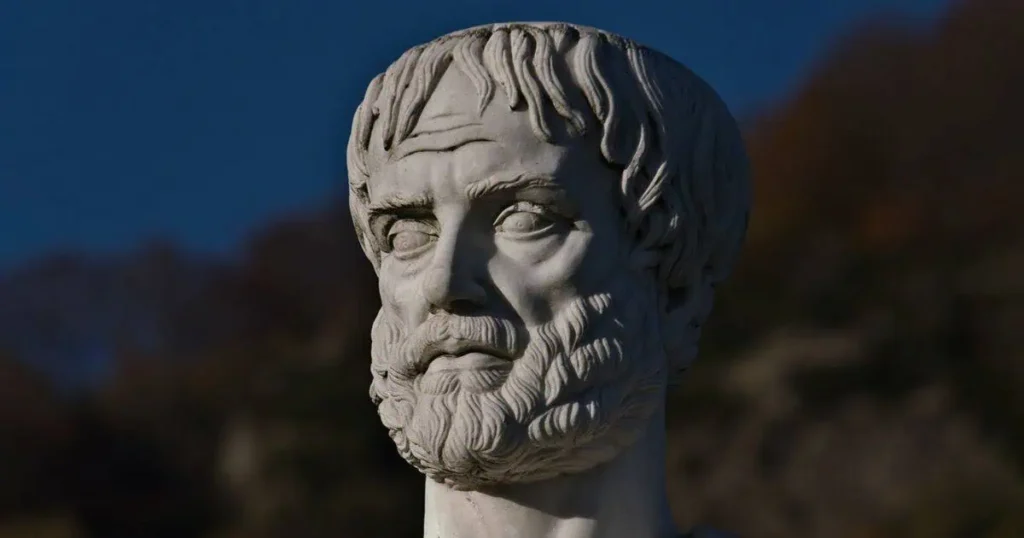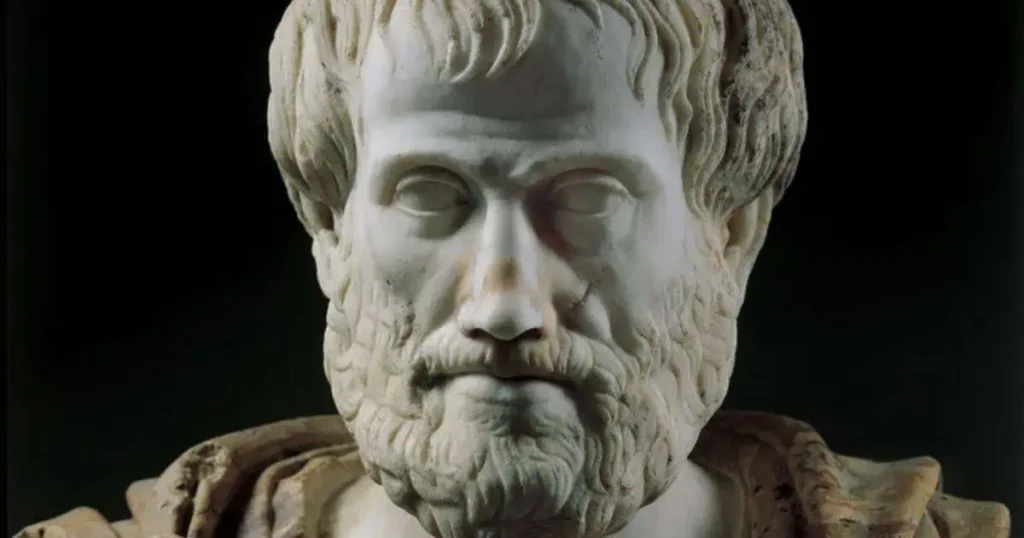Aristotle’s insights into education have profoundly influenced educational philosophy for centuries. As a central figure in classical philosophy, he explored education’s role in society extensively. His ideas on teaching and learning are integral to his broader philosophical system, focusing on nurturing virtuous, well-rounded individuals.
Aristotle viewed education as essential for achieving a balanced and meaningful life, blending theoretical knowledge with practical skills. He believed that while knowledge is valuable, it should also serve public purposes, preparing individuals to contribute effectively to society. By emphasizing the link between education and virtue, Aristotle highlighted the need for a thoughtful pedagogical approach to develop a morally and intellectually capable populace.
Aristotle Books
Aristotle addresses education in Nicomachean Ethics and Politics. In Nicomachean Ethics, he emphasizes how education is key to developing virtue and moral character. This book connects virtue ethics with the cultivation of ethical behavior and a well-rounded individual.
In Politics, Aristotle explores the role of education in creating a just society. He argues that educational philosophy must balance theoretical knowledge with practical skills to prepare citizens for their roles. This work highlights the importance of a thoughtful pedagogical approach in achieving intellectual growth and effective ethical teaching.
Nicomachean Ethics (c. 340 B.C.): Aristotle connects ‘eudaimonia’ (happiness) with education. He argues education is key to developing virtues and living well. It links virtue ethics with moral development.
Politics (c. 350 B.C.): Aristotle views education as vital for a just society. He sees it as a societal duty to create good citizens. This work highlights a balanced educational philosophy for intellectual growth and ethical teaching.
Metaphysics (c. 350 B.C.): Aristotle explores reality and knowledge, impacting critical thinking in education. His ideas lay the groundwork for understanding knowledge in educational theories.
Rhetoric (c. 350 B.C.): Aristotle examines rhetoric as a tool for teaching. He argues for its inclusion in a comprehensive education. This work combines practical skills with theoretical learning.
On the Soul (c. 350 B.C.): Aristotle discusses the soul and mind, influencing the psychological aspects of education. His work aids in understanding how mental processes affect learning.
Aristotle’s Philosophical Background
Historical Context
Aristotle lived in ancient Greece during the 4th century B.C., a period rich in intellectual activity. He was a student of Plato and tutored Alexander the Great, merging classical ideas with his own. This era’s philosophical debates deeply influenced his thought. Understanding this context helps to appreciate his impact on classical philosophy.
Greece was a center for philosophical inquiry and intellectual development. The vibrant discussions of the time shaped Aristotle’s perspectives. His contributions are part of the broader tradition of Greek philosophy. This background is crucial for grasping the significance of his work
Influence of Plato
Aristotle studied under Plato at the Academy, which significantly shaped his early philosophical views. While he respected Plato’s ideas, he also critiqued and developed his own theories. This contrast, especially in metaphysics and ethics, marked a shift from Plato’s ideal forms to Aristotle’s empirical approach.
Aristotle’s divergence from Plato’s theories introduced new methods and concepts. For example, Aristotle emphasized empirical observation rather than Plato’s idealism. This shift influenced the development of Western philosophy and scientific methodology
Key Philosophical Concepts
Aristotle’s philosophy includes concepts like eudaimonia (flourishing) and virtue ethics. He believed that achieving happiness involves living virtuously and finding a balance, known as the Golden Mean. These ideas are central to his theories on moral development and ethical behavior.
His work extended into metaphysics, logic, and rhetoric. Aristotle’s theories laid the groundwork for Western thought and scientific inquiry. His comprehensive approach influences various fields, including ethics, politics, and education.
Impact and Legacy
Aristotle’s ideas have significantly impacted fields such as ethics, politics, and science. His methods of observation and analytical thinking paved the way for future developments in scientific research and philosophical inquiry. His influence is evident in the works of medieval scholars and modern thinkers.
His legacy continues in contemporary education and research. Aristotle’s work shaped the intellectual tradition and remains relevant in various academic disciplines. His contributions to philosophical thought and theoretical frameworks are still studied and applied today.
Aristotle’s Philosophical Background
Education in Aristotle’s Politics
Aristotle argued that education should be a public responsibility, not just a private concern. He believed a well-organized public education system is crucial for a state’s stability and prosperity. Education helps to shape citizens and integrate them into the state, aligning their development with societal needs.
According to Aristotle, education influences both personal growth and societal health. It ensures that individual progress contributes effectively to the state’s goals. This connection highlights the importance of government responsibility in managing education and maintaining societal harmony.
A robust education system supports the integration of citizens into their communities. It prepares individuals to fulfill their roles in the state, reinforcing the alignment between personal and public interests. This approach underscores how education serves as a foundation for societal stability and prosperity.
Character and Civic Education
Aristotle emphasized the importance of character education for moral development. He saw education as a tool for cultivating virtue and ethical behavior, beyond just delivering knowledge. Developing a strong character is essential for responsible and ethical citizenship.
Civic education is crucial for preparing individuals to participate actively in the political community. It teaches how to act for the common good and understand one’s responsibilities within the state. This approach integrates moral education with civic duty, ensuring well-rounded personal and public development.
Aristotle’s view combines character and civic education to create responsible citizens. By focusing on both ethical behavior and practical skills, education fosters individuals who contribute positively to their communities. This holistic approach ensures that citizens are not only knowledgeable but also morally and socially responsible.
The Purpose and Types of Education According to Aristotle
Aristotle’s Vision for Education: Aristotle, the renowned Greek philosopher, had a unique perspective on the role of education in society. He viewed education as a means to develop both the mind and character, aiming to prepare individuals for active participation in their community. This holistic approach underscores his belief that education is crucial for cultivating well-rounded citizens.
Theoretical education: Aristotle made a clear distinction between theoretical and practical knowledge. Theoretical knowledge, or episteme, involves understanding fundamental principles and is found in disciplines like science, mathematics, and philosophy* It focuses on the “why” of things, aiming for deep comprehension.
In contrast, practical knowledge, or techne, deals with the “how” of doing things. This includes fields such as the arts, crafts, and military strategy. It’s about acquiring skills and techniques for accomplishing specific tasks, reflecting a hands-on approach to learning.
Moral and Intellectual Virtues: According to Aristotle, education should nurture both moral and intellectual virtues Moral virtues, such as courage and temperance, pertain to character and govern actions. They are developed through practice and habituation, emphasizing the importance of ethical behavior.
Intellectual virtues, cultivated through instruction enhance reasoning and understanding. Mastery in areas like rhetoric and literature enriches these virtues, improving your ability to reason and communicate effectively. This dual focus helps create individuals who are both virtuous and intellectually capable.
Educational Process and Pedagogy
Aristotle’s approach to education emphasizes the importance of habituation in character development. Forming good habits helps students develop virtues, which become second nature. He also stresses the importance of learning disciplines in a well-ordered sequence to enhance intellectual growth.
In Aristotle’s view, education is closely linked to character formation. Habituation, the process of repeating good actions until they become habits, shapes a person’s character. Through consistent practice of virtuous behavior, students learn to act ethically out of habit, not force.
Aristotle believes that education should follow a logical sequence, much like building blocks. Students first master foundational subjects, such as reading and writing, before progressing to more abstract fields like philosophy. This step-by-step structure strengthens reasoning skills and intellectual abilities.
For Aristotle, the intertwining of character development and intellectual growth is essential. As students develop virtues through habituation, their minds are also being prepared for more complex learning. This holistic approach ensures a balanced educational experience.
Aristotle’s Impact on Educational Theory
Introduction to Aristotle’s Educational Theory: Aristotle’s educational theory focuses on both moral and intellectual development. He believes that education shapes both character and mind. This dual approach has influenced modern educational practices.
Role of Habituation in Learning: Aristotle emphasizes the importance of habituation in developing virtuous behavior. Repeated actions help form good habits that become automatic. This method strengthens moral character and ethical decision-making.
Structured Sequence of Disciplines: Aristotle advocates for a structured learning process, starting with basic subjects. As students master foundational knowledge, they gradually move to more complex topics. This progression ensures intellectual growth and understanding.
Integration of Ethics and Knowledge: For Aristotle, education integrates ethics and knowledge. He believes that learning is not just about acquiring information but also about developing a virtuous character. This holistic approach has a lasting influence on education.
Aristotle’s Influence on Modern Education: Aristotle’s ideas continue to shape modern educational systems. His focus on moral development and structured learning remains relevant. Educators still apply his theories in teaching methods today.
The Connection Between Ethics and Education

Aristotle saw education as vital for cultivating moral virtues, which form the foundation of good character. He believed that education could shape your actions and desires, aligning them with justice and eudaimonia, or human flourishing. Through education, individuals learn to develop virtues that lead to a fulfilling life.
For Aristotle, moral education is about shaping your character to naturally desire what is good and just. It goes beyond learning rules; it nurtures virtues like courage and temperance, which become ingrained in who you are. Education helps form these virtuous habits, creating a foundation for ethical living.
Techniques and Content of Aristotelian Education
Aristotle strongly advocated for a well-rounded education that combined both theoretical and practical knowledge. He believed that learning should engage not only the intellect but also the character of the student. His educational approach aimed to develop both the mind and moral virtues, ensuring comprehensive personal growth.
At Aristotle’s Lyceum, the curriculum was diverse and challenging. Students studied subjects like metaphysics, physics, psychology, and other sciences, gaining a broad understanding of the world. These subjects were structured to develop intellectual abilities while also shaping moral character. In physics, students explored the natural world, while metaphysics helped them grasp deeper concepts of existence. In psychology, Aristotle guided students through an exploration of the human mind and behavior.
Beyond the sciences, the education included rhetorical and musical training to create a balanced learning experience. Rhetoric equipped students with persuasive communication skills, crucial for public life. Music was valued for its ability to influence character, fostering an appreciation for harmony in both life and art. Through these disciplines, students refined their communication abilities and ethical understanding.
Aristotle’s Contributions to Various Disciplines

Aristotle’s work significantly impacted philosophy, science, and the arts. His theories integrated logic into many fields, creating a foundation for structured thinking. This integration shaped intellectual growth across different areas of study.
Advancements in Logical Thinking: Aristotle introduced the concept of categorical syllogism, a key development in logic. This form of reasoning allows conclusions to be drawn from two premises. His contributions are still vital in fields like law, computer science, and artificial intelligence.
Contributions to the Sciences: Aristotle’s scientific work covered topics from biology to astronomy. He established classifications of living organisms, earning him the title of the father of biology. His framework for studying the natural world influenced science for centuries.
Influence on the Arts and Aesthetics: Aristotle analyzed dramatic narratives in works like Poetics laying early principles of aesthetics. His approach merged scientific observation with artistic critique. These ideas helped shape the understanding and creation of literature and other art forms.
Influence of Aristotle on Modern Education
Aristotle’s impact on education extends to both the arts and sciences. His focus on knowledge and character development has shaped contemporary educational systems. The integration of virtue ethics into educational theory reflects his belief in balancing intellectual and moral growth.
Influence on Educational Systems
Aristotle’s ideas are evident in today’s higher education, where both practical skills and moral understanding are emphasized. His educational model supports a holistic approach, combining academic learning with character building. This approach is visible in the liberal arts education model, which aims to develop well-rounded individuals.
FAQS
Methods of Inquiry and Research
Aristotle’s research methods laid the groundwork for mixed methods research, combining empirical analysis with logical reasoning. His observational techniques and categorization in biology influence modern scientific practices. His contributions to deductive reasoning and syllogisms continue to shape critical thinking and argument analysis in education.
A famous quote from Aristotle about education?
“Educating the mind without educating the heart is no education at all.” This means Aristotle valued moral and emotional learning alongside intellectual education.
What did Aristotle believe?
Aristotle believed that everything has a purpose and reason, which can be understood through logic. He also thought humans should live in balance, using both reason and ethics.
What is the main concept of Aristotle?
His main concept is the idea of *virtue ethics*, which means acting with virtue and moral character leads to happiness. Aristotle believed that people should aim for a balanced life, avoiding extremes.
What did Einstein say about education?
Einstein once said, “Education is not the learning of facts, but the training of the mind to think.” He believed that true education should focus on developing thinking skills rather than memorizing information.
Conclusion
Aristotle and Einstein emphasized the deeper meaning of education. Aristotle believed education should shape both the mind and the heart, focusing on moral and intellectual development. He valued balance and the pursuit of virtue. Einstein, on the other hand, stressed the importance of teaching people how to think, not just memorizing facts. Both philosophers viewed education as essential to personal growth and the betterment of society. Their ideas remain influential today.
Also Read
History of Education in Nigeria
Top 10 “Worst Events in History”
Champion Tag History: A Look Through Time

Evelyn is an expert in Travel, History, and Leadership, bringing a wealth of knowledge and insights to our site. Their diverse background enriches our content and provides valuable perspectives.
